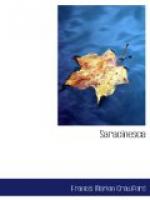“Do not talk like that,” said Corona. “You have vanity, of course, but it is of the large kind, and I call it ambition. It is not only because I love you better than any man was ever loved before that I say that. It is that I know it instinctively I have heard you say that these are unsettled times. Wait; your opportunity will come, as it came often to your forefathers in other centuries.”
“I hardly think that their example is a good one,” replied Giovanni, with a smile.
“They generally did something remarkable in remarkable times,” said Corona. “You will do the same. Your father, for instance, would not.”
“He is far more clever than I,” objected Giovanni.
“Clever! It passes for cleverness. He is quick, active, a good talker, a man with a ready wit and a sharp answer—kind-hearted when the fancy takes him, cruel when he is so disposed—but not a man of great convictions or of great actions. You are very different from him.”
“Will you draw my portrait, Corona?” asked Giovanni.
“As far as I know you. You are a man quick to think and slow to make a decision. You are not brilliant in conversation—you see I do not flatter you; I am just. You have the very remarkable quality of growing cold when others grow hot, and of keeping the full use of your faculties in any situation. When you have made a decision, you cannot be moved from it; but you are open to conviction in argument. You have a great repose of manner, which conceals a very restless brain. All your passions are very strong. You never forgive, never forget, and scarcely ever repent. Beneath all, you have an untamable ambition which has not yet found its proper field. Those are your qualities—and I love them all, and you more than them all.”
Corona finished her speech by throwing her arms round his neck, and breaking into a happy laugh as she buried her face upon his shoulder. No one who saw her in the world would have believed her capable of those sudden and violent demonstrations—she was thought so very cold.
When Giovanni reached home, he was informed that his father had left Rome an hour earlier by the train for Terni, leaving word that he had gone to Aquila.
CHAPTER XXIX.
In those days the railroad did not extend beyond Terni in the direction of Aquila, and it was necessary to perform the journey of forty miles between those towns by diligence. It was late in the afternoon of the next day before the cumbrous coach rolled up to the door of the Locanda del Sole in Aquila, and Prince Saracinesca found himself at his destination. The red evening sun gilded the snow of the Gran Sasso d’Italia, the huge domed mountain that towers above the city of Frederick. The city itself had long been in the shade, and the spring air was sharp and biting. Saracinesca deposited his slender luggage with the portly landlord, said he would return for supper in half an hour, and inquired the way to the church of San Bernardino da Siena. There was no difficulty in finding it, at the end of the Corso—the inevitable “Corso” of every Italian town. The old gentleman walked briskly along the broad, clean street, and reached the door of the church just as the sacristan was hoisting the heavy leathern curtain, preparatory to locking up for the night.




